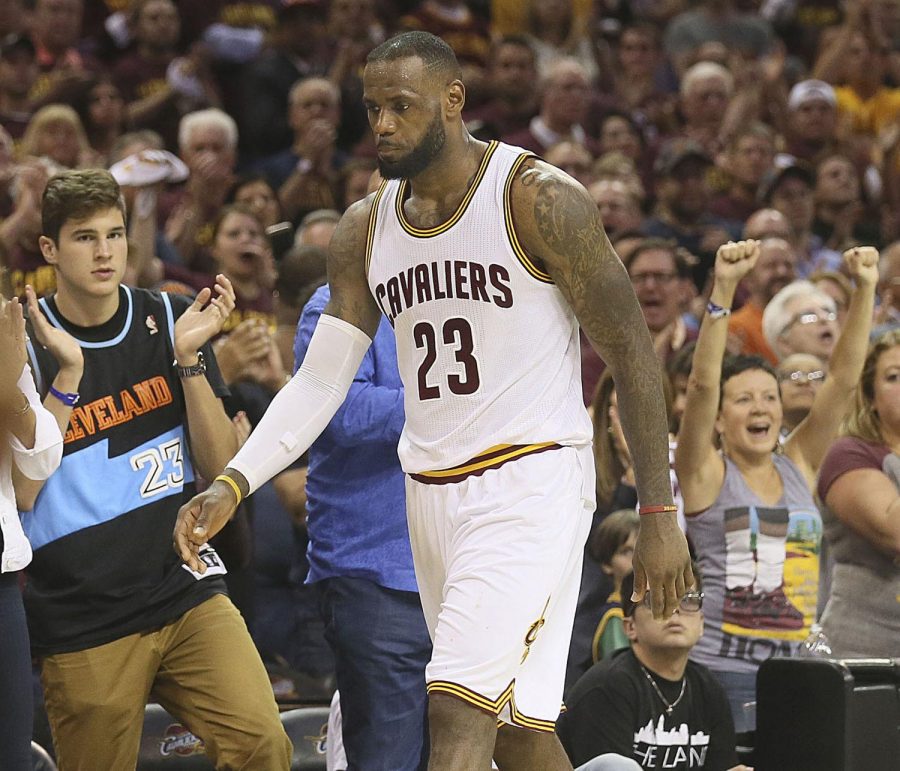Finding faults in LeBron James an irritatingly off-base excercise
June 19, 2015
In the choose-your-own-adventure book that has been LeBron James’ basketball career, it appears that the final page is inevitable — polarization.
The greatest basketball player in the world — a title that only the most out-of-touch and hard-headed fans would even consider disputing — has inexplicably become a figure of great public debate. It is debate that only a player of his talent, his athleticism and his acuity could garner, but it is debate that has resulted in the formation of a partisan argument involving hollow, meaningless words like “legacy” and “clutch.”
The latest development in his saga is perhaps the most hard to swallow. Despite averaging an unfathomable and unprecedented 35.8 points, 13.3 rebounds and 8.8 assists per game in the 2015 NBA Finals, his Cleveland Cavaliers lost to the high-octane artillery of the Golden State Warriors in six games, leaving James’ biggest detractors chomping at the bit.
“He shrinks in the final seconds!” they’ll say about a man who hit a buzzer-beating shot to beat the Chicago Bulls in a pivotal second round game just weeks ago.
“He’ll never be Michael Jordan!” they’ll say about a man who still appears to have ample time to add to his legacy and surpass his idol.
“He’s a loser!” they’ll say about a man with two NBA championships and four MVP awards who nearly single-handedly willed a junior varsity-caliber Cleveland Cavaliers team to two wins against a juggernaut Golden State squad.
The people finding fault in James’ performance in these Finals are irredeemably off-base. It’s like someone complaining that Beethoven’s Ninth Symphony doesn’t have any electric guitar in it, or that “Citizen Kane” is in black and white and not color.
James has had one personal misstep — his nationally televised “Decision” in 2010 announcing that he would be leaving his hometown Cleveland Cavaliers for the Miami Heat (a venture that raised millions for Boys and Girls Clubs of America) — and one major athletic misstep — his shrunken performance in a 2011 NBA Finals loss to the Dallas Mavericks.
Essentially, James has as close to a squeaky-clean resume as a superstar athlete can possibly wield. An athlete of his status couldn’t possibly carry themselves more in the manner that our society demands them. He is accessible and likeable, appearing in countless mediums from “Saturday Night Live” to Judd Apatow’s upcoming film, “Trainwreck.” There is nothing detestable about James the person– a rare trait for an athlete of his acumen.
Despite recent reports about his feuding and disrespect with current head coach David Blatt, James never unleashed a public meltdown against the first-year coach — or any coach for that matter. If every person in America was held in contempt for at one point disagreeing with their boss’ decision making, our unemployment rate would be higher than Stephen Curry’s free throw percentage. It’s another futile grasp at straws to paint LeBron James as a villain.
Perhaps what irks the legions of anti-LeBron soldiers is that he challenges the framework of what an all-time-great’s resume traditionally looks like. He has everything one can ask for, except for an impeccable record in the NBA Finals. Two championships aren’t enough. Forget that winning is not a measure of an individual, but a collective measure. Michael Jordan has six rings. LeBron doesn’t. The discussion ends there for those people.
I feel sorry for these people who can’t just pop a squat on the couch, watch the Cleveland Cavaliers and comprehend the privilege it is to watch James play basketball. He’s a virtuoso that an alarmingly large percentage of people treat like a rag doll.
Maybe one day, long after James in enshrined in the Naismith Hall of Fame, when there is a new phenom to set unreasonable standards for, these same people will chastise that dynamo for never being as good as LeBron James was. Until then, they’re simply throwing dirt on a Picasso.








